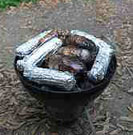
Average daily carbon
Good news for anyone living off-grid in the UK — the environment Secretary has radical plans to create a ‘personal carbon trading scheme’. Individuals would be allotted credits to be deducted as they undertake CO2-emitting activities, such as buying gas for the car or taking a flight.
Each person in the UK emits 9 tons of carbon per year on average, but off-gridders use only a tenth of that, so will end up making money from the scheme.
Carbon allowances would cover people’s direct use of energy through their electricity, gas, petrol and air travel – which makes up 44% of the economy’s total emissions.
The system – which would use a bank-style smartcard – is intended to reward those who are most energy efficient in their daily lives, and penalize those who are the heaviest consumers.
But it may take time to introduce the scheme . The only macro-level carbon credit project currently in operation, the EU’s emissions trading scheme, is seemingly in disarray as most European counties allowed polluters far too much leeway when allocating carbon allowances.
Author David Fleming, and Friends of the Irish Environment have gone a long way towards developing how it would work in practice.
A Brief Guide
1. Tradable Energy Quotas (TEQs) are an electronic system for rationing energy.
2. There are two reasons why energy-rationing may be needed. And soon:
Climate change: to reduce the carbon dioxide released into the air when oil, gas and coal are used
Energy supply: to maintain a fair distribution of oil, gas and electric power during shortages
3. TEQs (pronounced ‘tex’) are measured in units.
4. Every adult is given an equal number of units. Industry and Government bid for their units at a weekly Tender.
5. At the start of the scheme, a full year’s supply is placed on the market. Then, every week, the number of units in the market is topped up with a week’s supply.
6. Units can be traded. If you use less than your entitlement, you can sell your surplus. If you need more, you can buy them.
7. When you buy energy, such as petrol for your car or electricity for your household, units equivalent to that amount of energy are deducted from your TEQs account. Most transactions are automatic, using direct-debit technology.
8. The number of units available is set out in the TEQs Budget, which looks 20 years ahead. The size of the Budget goes down week-by-week step-by-step, like a staircase.
9. The Budget is set by an independent Energy Policy Committee.
10. The Government is itself bound by the scheme; its role is to work out how to live within it, and to help the rest of us to do so.
The scheme would be more fair than tax increases because personal carbon allowances provide free entitlements and only offered financial penalties for those who go above their entitlement.
‘People on low incomes are also likely to benefit as they will be able to sell their excess allowances. People on higher incomes tend to have higher carbon emissions due to higher car ownership and usage, air travel and tourism and larger homes.
Carbon loyalty cards, league tables, the use of carbon offsets at point of purchase for certain sectors, awareness-raising through labelling and carbon calculations are all being investigated as potential long-term measures.
But any such scheme is many years away. Measures that should be taken now to reduce UK carbon dioxide emissions, including phasing out energy inefficient products.